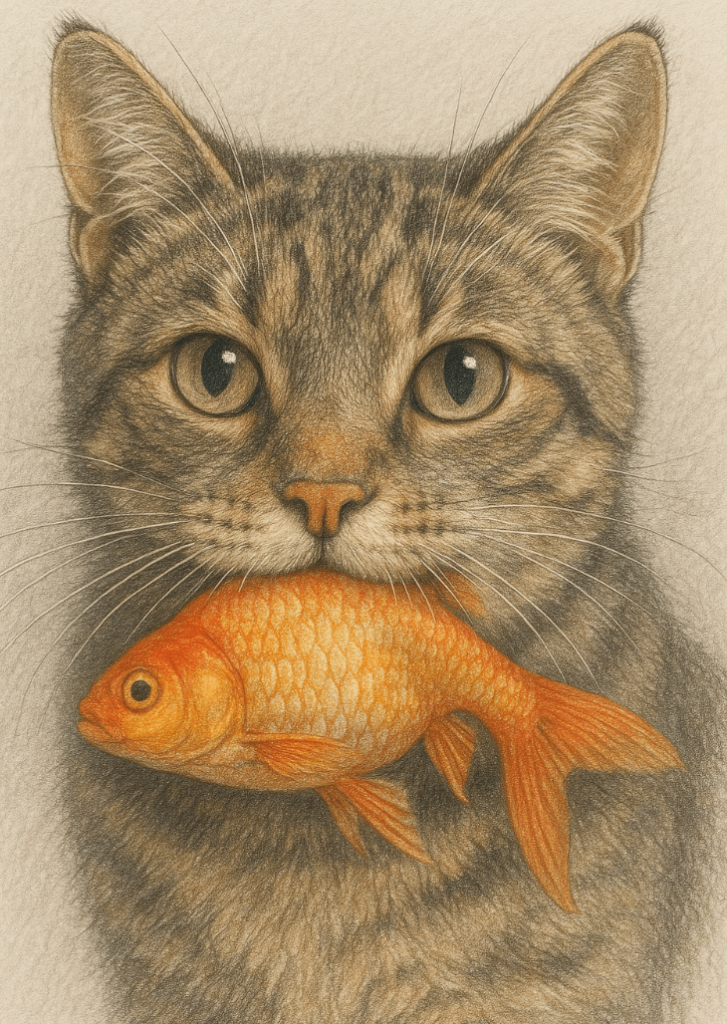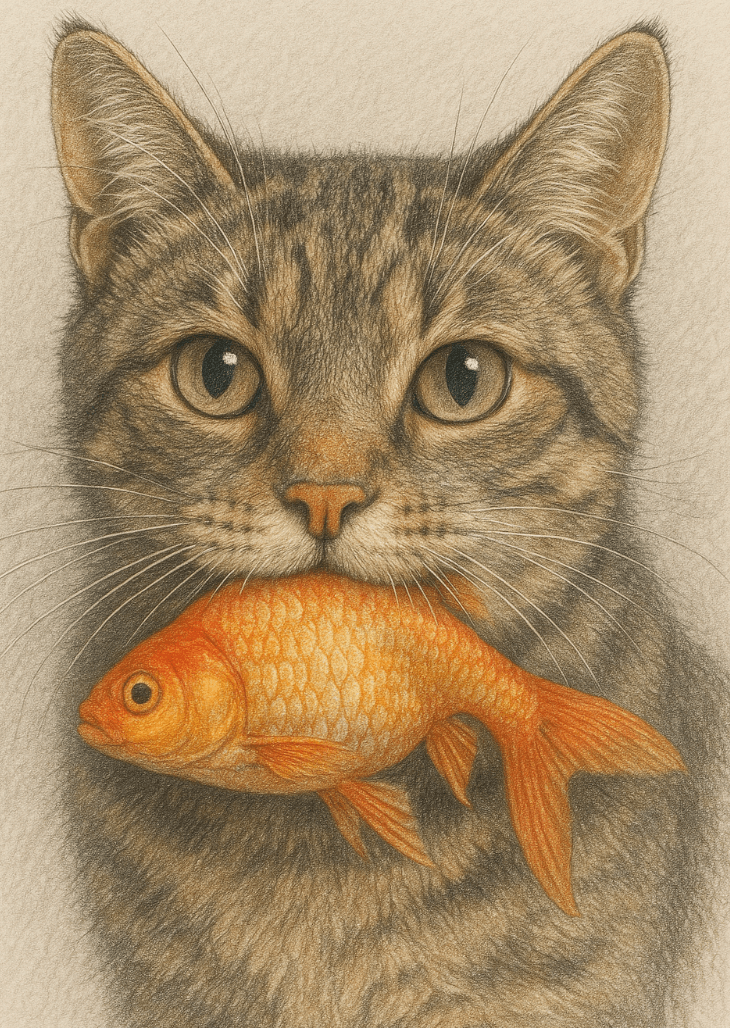Can Cats Eat Goldfish?
Cats are curious creatures, and their natural hunting instincts often lead them to show interest in small, moving objects—like goldfish. If you’ve ever caught your feline friend eyeing your pet goldfish or even attempting to “snack” on one, you may be wondering whether it’s safe for cats to eat goldfish. While cats are obligate carnivores and goldfish might seem like a natural prey item, there are important considerations to keep in mind. In this blog post, we’ll explore the potential risks and benefits of cats eating goldfish, safer alternatives, and how to keep both your cat and your fish safe.
Potential Risks of Cats Eating Goldfish
While it might seem harmless for a cat to snack on a goldfish, there are several risks associated with this behavior that every pet owner should be aware of.
Parasites and Bacteria:
Goldfish can carry parasites or harmful bacteria, such as Salmonella, which can make your cat sick if ingested.Choking Hazard:
Swallowing a whole goldfish, especially a larger one, could pose a choking risk for your cat.Nutritional Imbalance:
Goldfish do not provide the essential nutrients cats need, and relying on them as food could lead to dietary deficiencies.Toxic Tank Additives:
Chemicals used in aquariums, such as water treatments or medications, can be toxic if ingested by your cat along with the fish.Stress for Both Animals:
The act of hunting and eating goldfish can stress out your fish while encouraging aggressive behavior in your cat.
These risks highlight why it’s best to discourage your cat from eating goldfish altogether.
What Happens If Your Cat Eats a Goldfish?
If your cat manages to eat a goldfish, it’s important to monitor them closely for any signs of distress or illness. Here’s what you should know about the potential outcomes.
Mild Upset Stomach:
Many cats may experience vomiting or diarrhea after eating a goldfish due to unfamiliar proteins or bacteria.Parasitic Infections:
Parasites carried by the goldfish could infect your cat, requiring veterinary treatment to resolve.No Immediate Symptoms:
Some cats may show no immediate reaction but could develop health issues over time if exposed to harmful substances.Behavioral Changes:
A cat who has eaten a goldfish might become more aggressive or persistent in trying to hunt other fish.Veterinary Intervention:
If you notice signs of illness, such as lethargy, loss of appetite, or unusual behavior, contact your vet immediately.
By being vigilant, you can address any complications early and ensure your cat remains healthy.
Check this guide 👉Can Cats Eat Cake? Best 7 Expert Tips!
Check this guide 👉Can Cats Eat Sour Cream? Best 7 Expert Tips!
Check this guide 👉Can Cats Eat Ketchup? Best 7 Expert Tips!

Safe Alternatives to Goldfish | Risks of Feeding Goldfish to Cats |
|---|---|
High-quality commercial cat treats | Risk of bacterial infections |
Cooked, boneless fish (e.g., salmon) | Potential exposure to parasites |
Freeze-dried meat snacks | Choking hazards from swallowing whole fish |
Interactive toys mimicking prey | Toxicity from aquarium chemicals |
Homemade cat-safe recipes | Nutritional imbalance and deficiencies |
How to Keep Your Goldfish Safe from Your Cat
Protecting your goldfish from your cat’s predatory instincts requires proactive measures. These strategies will help ensure harmony between your pets.
Secure Aquarium Placement:
Place the aquarium on a sturdy stand and use a lid or mesh cover to prevent your cat from accessing the tank.Use Deterrents Near the Tank:
Motion-activated air sprayers or sticky mats around the base of the aquarium can deter your cat from approaching.Provide Distractions:
Offer your cat interactive toys or puzzle feeders to redirect their attention away from the fish tank.Create Physical Barriers:
Use baby gates or furniture arrangements to block your cat’s access to the area where the aquarium is located.Supervise Interactions:
Always supervise your cat when they’re near the aquarium to intervene if necessary.
Taking these precautions ensures your goldfish remains safe while satisfying your cat’s curiosity.
Signs Your Cat May Be Obsessed with Hunting Fish
Some cats develop an intense fascination with fish, which can escalate into problematic behavior if left unchecked. Watch for these signs to determine if your cat needs redirection.
Pawing at the Tank:
Repeated attempts to reach into the aquarium indicate a strong hunting instinct.Staring for Long Periods:
Cats who spend hours fixated on the tank may become frustrated if they can’t access the fish.Knocking Over Objects:
A cat obsessed with hunting might knock over nearby items in an effort to get closer to the tank.Increased Aggression:
Frustration from being unable to catch the fish can lead to irritability or aggression toward other pets.Ignoring Other Activities:
If your cat neglects toys or meals in favor of watching the tank, it’s time to intervene.
Recognizing these behaviors allows you to take steps to curb unhealthy obsessions before they escalate.
Common Mistakes Pet Owners Make with Cats and Fish
When managing interactions between cats and fish, certain mistakes can inadvertently put both animals at risk. Avoiding these pitfalls ensures a safer coexistence.
Leaving the Aquarium Uncovered:
An uncovered tank invites trouble, as cats can easily jump up and attempt to grab the fish.Assuming Cats Will Lose Interest:
Cats have strong hunting instincts; assuming they’ll ignore the tank can lead to accidents.Using Harmful Deterrents:
Avoid harsh sprays or loud noises near the tank, as these can stress out the fish and damage trust with your cat.Neglecting Environmental Enrichment:
Without proper stimulation, cats are more likely to focus obsessively on the tank.Feeding Fish to Cats Out of Curiosity:
Experimenting with feeding goldfish to your cat can introduce harmful bacteria or parasites.
Avoiding these mistakes fosters a peaceful home environment for all your pets.
Healthier Protein Options for Your Cat
Instead of letting your cat snack on goldfish, consider these healthier protein sources that align with their dietary needs.
Cooked Chicken or Turkey:
Lean meats like chicken or turkey are excellent sources of protein and easy to digest.Commercial Cat Treats:
Specially formulated treats provide safe and balanced nutrition without the risks associated with live prey.Freeze-Dried Fish Snacks:
These snacks offer the taste of fish without the risks of contamination or parasites.Bone Broth (Unsalted):
Bone broth is a hydrating and nutritious treat that many cats enjoy.Homemade Cat Food Recipes:
With guidance from your vet, prepare homemade meals tailored to your cat’s specific dietary requirements.
These options ensure your cat receives the nutrients they need without compromising their health.
Fun Ways to Redirect Your Cat’s Hunting Instincts
Redirecting your cat’s focus away from the goldfish tank can be achieved through engaging activities that satisfy their natural instincts.
Interactive Laser Toys:
Laser pointers mimic the movement of prey, providing endless entertainment for your cat.Feather Wands:
Feather wands encourage jumping and pouncing, channeling your cat’s energy into playful exercise.Puzzle Feeders:
Puzzle feeders challenge your cat mentally while rewarding them with treats or kibble.Window Perches for Bird Watching:
Installing a perch near a window allows your cat to observe birds safely without direct interaction.Catnip-Filled Toys:
Toys infused with catnip stimulate excitement and provide a fun outlet for hunting behavior.
These activities keep your cat entertained and reduce their fixation on the goldfish tank.
Frequently Asked Questions About Cats and Goldfish
Can cats safely eat raw fish?
Raw fish should be avoided as it can contain harmful bacteria or parasites that may sicken your cat.
Will my cat get sick if they eat a goldfish?
It depends on the health of the goldfish and any contaminants present, but there’s always a risk of illness.
How can I stop my cat from hunting my goldfish?
Use deterrents, secure the tank, and redirect your cat’s attention with toys or activities.
Are there any nutritional benefits to feeding goldfish to cats?
No, goldfish lack the nutrients cats need and should not be considered a dietary supplement.
What should I do if my cat eats a goldfish?
Monitor your cat for symptoms of illness and consult your veterinarian if you notice any concerning signs.
Prioritizing Safety for Both Your Cat and Your Goldfish
While cats are natural hunters and may find goldfish intriguing, it’s crucial to prioritize the safety and well-being of all your pets. Feeding goldfish to your cat poses unnecessary risks, and allowing them to interact unsupervised can lead to stress or injury for both animals. By taking preventive measures, providing appropriate distractions, and offering nutritionally balanced alternatives, you can create a harmonious environment where both your cat and your goldfish thrive. Remember, a little planning goes a long way in ensuring everyone stays happy and healthy!
Do Cats Have Taste Buds? Best 7 Expert Tips! – Discover how cats experience flavors and why their taste is so unique.
Do Dogs Have Taste Buds? Best 7 Expert Tips! – Discover how dogs experience taste, their preferences, and what it means for their diet and health.
Can Cats Taste Sweet? Best 7 Expert Tips! – Discover why cats can’t taste sweetness, how it affects their diet, and tips to keep them healthy and happy.
Can Dogs Taste Sweet? Best 7 Expert Tips! – Discover how dogs perceive sweetness, which foods are safe, and tips to manage their sweet cravings responsibly.





